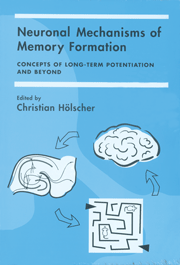Book contents
- Frontmatter
- Contents
- Contributors
- Introduction: Long-Term Potentiation as a Model for Memory Mechanisms: The Story So Far
- Section One Long-Term Potentiation In Vitro and In Vivo: How Can We Fine-Tune the Current Models for Memory Formation?
- Section Two There is More to the Picture Than Long-Term Potentiation: Theta or Gamma Oscillations in the Brain and the Facilitation of Synaptic Plasticity
- Section Three Making Models from Empirical Data of Synaptic Plasticity
- Section Four Setting the Stage for Memory Formation: Stress, Arousal, and Attention
- 13 Strategies for Studying the Role of LTP in Spatial Learning: What Do We Know? Where Should We Go?
- 14 What Studies in Old Rats Tell Us about the Role of LTP in Learning and Memory
- 15 Implications of the Neuropsychology of Anxiety for the Functional Role of LTP in the Hippocampus
- 16 Differential Effects of Stress on Hippocampal and Amygdaloid LTP: Insight Into the Neurobiology of Traumatic Memories
- Section Five Transgenic Mice as Tools to Unravel the Mechanisms of Memory Formation
- Conclusions and Future Targets
- Index
14 - What Studies in Old Rats Tell Us about the Role of LTP in Learning and Memory
Published online by Cambridge University Press: 13 October 2009
- Frontmatter
- Contents
- Contributors
- Introduction: Long-Term Potentiation as a Model for Memory Mechanisms: The Story So Far
- Section One Long-Term Potentiation In Vitro and In Vivo: How Can We Fine-Tune the Current Models for Memory Formation?
- Section Two There is More to the Picture Than Long-Term Potentiation: Theta or Gamma Oscillations in the Brain and the Facilitation of Synaptic Plasticity
- Section Three Making Models from Empirical Data of Synaptic Plasticity
- Section Four Setting the Stage for Memory Formation: Stress, Arousal, and Attention
- 13 Strategies for Studying the Role of LTP in Spatial Learning: What Do We Know? Where Should We Go?
- 14 What Studies in Old Rats Tell Us about the Role of LTP in Learning and Memory
- 15 Implications of the Neuropsychology of Anxiety for the Functional Role of LTP in the Hippocampus
- 16 Differential Effects of Stress on Hippocampal and Amygdaloid LTP: Insight Into the Neurobiology of Traumatic Memories
- Section Five Transgenic Mice as Tools to Unravel the Mechanisms of Memory Formation
- Conclusions and Future Targets
- Index
Summary
SUMMARY
Advanced aging is usually accompanied by declines in cognitive function, particularly in the areas of learning and memory. The presence of these behavioral deficits makes aged animals a good system in which to explore basic tenets of the hypothesis that long-term potentiation (LTP) is important for learning and memory. Here we review the existing literature describing studies of hippocampal LTP in aged rodents. These studies indicate that age-related decrements in LTP are often, but not always, reported; discrepancies between studies appear to be due to the stimulation protocol used or type of LTP being measured. Correlations between hippocampal LTP status and spatial learning ability in individual aged animals support the notion of an LTP/learning relationship, as do the results of interventional studies demonstrating that drug-related behavioral improvements also reduce LTP deficits. However, these promising results need verification and expansion. We conclude that, due to the complexity of the linkage between its physiologic and behavioral functions, the hippocampal system may not be appropriate for validating the hypothesis that LTP is critical for learning and memory. Nevertheless, studies of hippocampal LTP, particularly in aged animals, may provide an excellent framework for approaches to develop therapeutic interventions for age-related cognitive impairments.
Introduction
For many neuroscientists, long-term potentiation (LTP) has become a mantra for describing changes in the brain that are logically part of a memory encoding mechanism. However, problems arise when this idea is expressed as some formal hypothesis, the simplest examples of which are that inducing LTP should produce learning, or that preventing LTP should prevent learning.
- Type
- Chapter
- Information
- Neuronal Mechanisms of Memory FormationConcepts of Long-term Potentiation and Beyond, pp. 346 - 361Publisher: Cambridge University PressPrint publication year: 2000



